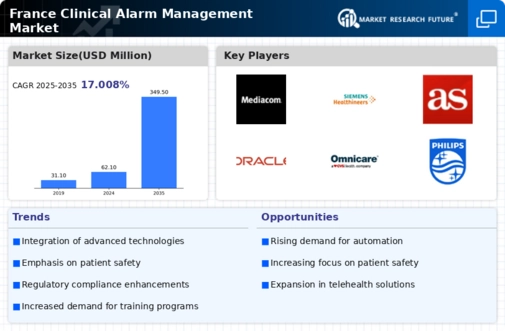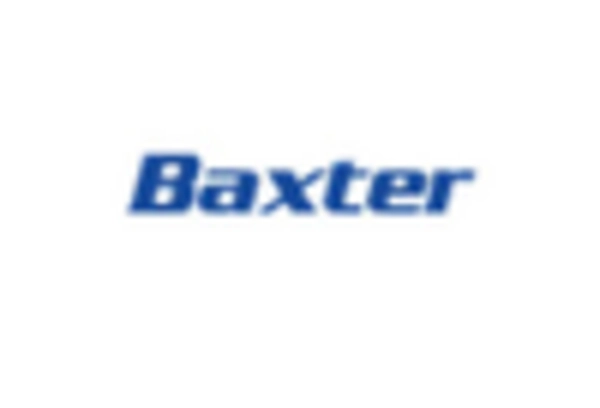Increased Regulatory Scrutiny
The clinical alarm-management market in France is also shaped by increased regulatory scrutiny surrounding alarm systems in healthcare settings. Regulatory bodies are implementing stricter guidelines to ensure that alarm systems are effective and do not contribute to alarm fatigue among healthcare professionals. For instance, the French Ministry of Health has introduced new standards that require hospitals to regularly assess and optimize their alarm systems. Compliance with these regulations is essential for healthcare facilities, as non-compliance could result in financial penalties and reputational damage. This regulatory environment is likely to drive investments in clinical alarm-management solutions, as hospitals strive to meet compliance requirements while enhancing patient safety. Consequently, the clinical alarm-management market is expected to see a surge in demand for compliant and efficient alarm management systems.
Rising Demand for Patient Safety
The clinical alarm-management market in France is experiencing a notable increase in demand driven by the heightened focus on patient safety. Hospitals and healthcare facilities are increasingly prioritizing the reduction of alarm fatigue among staff, which can lead to critical oversights. According to recent data, alarm-related incidents have been linked to approximately 80% of adverse events in clinical settings. This alarming statistic underscores the necessity for effective alarm management systems. As healthcare providers strive to enhance patient outcomes, investments in advanced alarm technologies are projected to rise, potentially reaching €500 million by 2027. This trend indicates a robust growth trajectory for the clinical alarm-management market, as stakeholders recognize the importance of integrating sophisticated alarm systems to mitigate risks and improve overall patient care.
Emphasis on Training and Education
The clinical alarm-management market is also impacted by an increasing emphasis on training and education for healthcare professionals. As alarm systems become more sophisticated, there is a growing recognition of the need for staff to be adequately trained in their use. In France, healthcare institutions are investing in comprehensive training programs to ensure that staff can effectively manage alarms and respond appropriately to alerts. This focus on education is crucial, as studies indicate that well-trained staff can significantly reduce alarm fatigue and improve patient safety outcomes. The investment in training initiatives is expected to contribute to the growth of the clinical alarm-management market, as healthcare providers recognize that effective alarm management is not solely reliant on technology but also on the competency of the personnel operating these systems.
Growing Focus on Operational Efficiency
The clinical alarm-management market is increasingly influenced by the growing focus on operational efficiency within healthcare facilities. Hospitals in France are under constant pressure to optimize their resources and improve patient care while managing costs. Effective alarm management is recognized as a critical component of operational efficiency, as it can reduce unnecessary alarms and streamline clinical workflows. By implementing advanced alarm management systems, healthcare providers can enhance staff productivity and minimize disruptions caused by alarm fatigue. This focus on efficiency is projected to drive market growth, with estimates suggesting that the clinical alarm-management market could expand by 30% over the next five years. As healthcare facilities seek to balance quality care with operational demands, the importance of effective alarm management will continue to rise.
Technological Advancements in Alarm Systems
The clinical alarm-management market is significantly influenced by rapid technological advancements in alarm systems. Innovations such as artificial intelligence (AI) and machine learning are being integrated into alarm management solutions, enabling more precise monitoring and response capabilities. These technologies can analyze patient data in real-time, reducing false alarms and enhancing the efficiency of clinical workflows. In France, the adoption of these advanced systems is expected to grow by approximately 25% over the next five years, reflecting a shift towards more intelligent healthcare solutions. As hospitals seek to optimize their operations and improve patient safety, the clinical alarm-management market is likely to benefit from these technological enhancements, leading to a more streamlined and effective alarm response process.
















